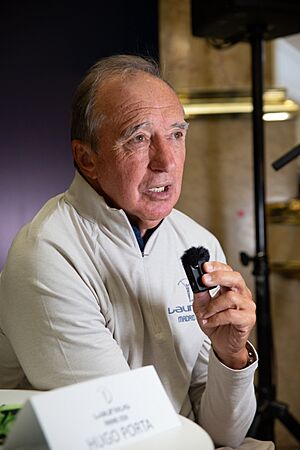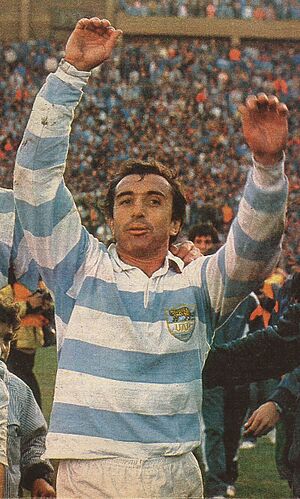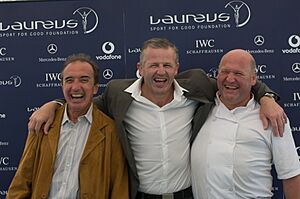Hugo Porta facts for kids

Porta in 2024
|
|||||||||||||||||||||||||||||||||
| Birth name | Hugo Porta | ||||||||||||||||||||||||||||||||
|---|---|---|---|---|---|---|---|---|---|---|---|---|---|---|---|---|---|---|---|---|---|---|---|---|---|---|---|---|---|---|---|---|---|
| Date of birth | 11 September 1951 | ||||||||||||||||||||||||||||||||
| Place of birth | Buenos Aires, Argentina | ||||||||||||||||||||||||||||||||
| University | UBA | ||||||||||||||||||||||||||||||||
| Occupation(s) | Architect | ||||||||||||||||||||||||||||||||
| Rugby union career | |||||||||||||||||||||||||||||||||
|
|||||||||||||||||||||||||||||||||
Hugo Porta was born on September 11, 1951. He is a famous retired rugby union player from Argentina. Many people think he is one of the best fly-halves (a key player who directs the team's attack) ever.
Hugo Porta is a member of both the International Rugby Hall of Fame and the IRB Hall of Fame. This shows how important he was to the sport. He played 58 games for the Argentine national team, known as Los Pumas. He was their captain 34 times. He even led them in the first ever Rugby World Cup in 1987.
Porta started playing for Argentina in 1971. Some of his best games were in the late 1970s and early 1980s. These included a tie with France in 1977. He also helped Argentina win against Australia in 1979. A famous game was the 21–21 tie with New Zealand in 1985.
In December 2018, Hugo Porta became the president of Banco Nación. This is the sports club where he played his whole career.
Contents
Hugo Porta's Rugby Journey
Hugo Porta was born in Buenos Aires, Argentina. He first played soccer and almost joined a big team called Boca Juniors. But then he decided to play rugby union instead. He joined the Banco Nación club.
Porta played his first game for Argentina on October 10, 1971. It was against Chile. That year, he played three more games against Brazil, Paraguay, and Uruguay. In 1972, Argentina played two games against South Africa in Buenos Aires.
Becoming a Captain and Key Matches
Porta played seven games for the national team in 1973. These included matches against Romania. He also played against teams from Ireland and Scotland. From 1974 to 1975, Argentina played four important games against France.
In 1977, Porta became the national team's captain. His first game as captain was against France. Argentina lost that game, but Porta scored all their points. In the next game, Argentina and France tied 18–18. Porta scored all 18 points for Argentina using penalty kicks.
In October 1978, Porta led Argentina in two more matches. One was against an England team, and the other was against Italy. The next year, he captained Los Pumas in two games against a New Zealand team.
On October 27, 1979, Porta led Argentina to a big win against Australia in Buenos Aires. They won 24–13. Porta scored 18 points in that game. He kicked two conversions, one penalty, and three drop goals. Even though they lost the next game, this win was a very important moment for Argentine rugby.
Playing for South American Jaguars
Porta was also the captain for the South American Jaguars team. This team went on three tours to South Africa between 1980 and 1984. After the 1980 tour, Porta led Argentina to two wins against Fiji. They also tied with England in 1981.
During the second South America tour in 1982, the Jaguars won a game in Bloemfontein. Porta scored all 21 points in that victory. Argentina also beat Australia 18–3 in Brisbane in 1983. Another South American tour happened in 1984. In June 1985, Argentina also defeated France 24–16.
A famous game happened on November 2, 1985. After losing to New Zealand, Argentina tied them 21–21. Porta scored all 21 points for Argentina in that game. He kicked four penalties and three drop goals. Hugo Porta is the only Argentine player to have played for the South African Barbarians Club.
World Cup and Later Life
Porta led Argentina in the 1987 Rugby World Cup. He was 36 years old at the time. He retired after this tournament. In their first World Cup game, Argentina lost to Fiji. But they won their next game, beating Italy 25–16. They lost their last game to New Zealand.
Porta briefly came out of retirement in 1990. He played games against Ireland, England, and Scotland. In 1991, he became Argentina's Ambassador to South Africa. Later, in 1994, he became Argentina's Minister for Sport. In 2000, his car was taken by thieves in Buenos Aires. But they returned it after they found out whose car it was.
In September 2007, Will Carling, a former England captain, said Porta was one of the top ten rugby players ever. Mark Ella, a former Australian fly-half, said he never played against a better fly-half than Porta.
Awards and Achievements
Hugo Porta received many awards for his amazing rugby career.
Team Successes
- Banco Nación
- Torneo de la URBA (2 wins): 1986, 1989
- Sevens championship (4 wins): 1974, 1984, 1987, 1988
Individual Awards
- Olimpia de Oro Award: This is for the "sportsman of the year" in Argentina, which he won in 1985.
- Olimpia de Plata Award: This is for the "rugby union player of the year" in Argentina. He won it five times: 1975, 1977, 1978, 1980, 1982.
- Midi Olimpique Magazine: Named him the "Best rugby union player of the world" in 1985.
- Rothmans Yearbook Magazine: Called him the "Best Fly-half of the 1980s" in 1989.
- He is a member of the Rugby hall of fame in New Zealand.
- He is the second all-time player with the most drop goals in test matches, with 28.
- He is the all-time top scorer for Argentina's top division, with 301 points.
- He is the second all-time top scorer for the Argentine national team, with 590 points (from 1970–1990).
- He is in the Guinness World Records for scoring seven penalties and one conversion in a single match in 1982 against the Springboks.
See also
 In Spanish: Hugo Porta para niños
In Spanish: Hugo Porta para niños
- International Rugby Hall of Fame
- IRB Hall of Fame
 | Aaron Henry |
 | T. R. M. Howard |
 | Jesse Jackson |



